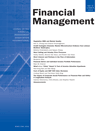
FINANCIAL MANAGEMENT
Scope & Guideline
Elevating Standards in Financial Discourse and Practice
Introduction
Aims and Scopes
- Corporate Governance and Management Practices:
Research often focuses on the dynamics of corporate governance, including the roles of executives, boards of directors, and their impact on firm performance and shareholder value. - Market Behavior and Efficiency:
Papers frequently explore market anomalies, investor behavior, and the efficiency of financial markets, contributing to our understanding of how information is processed in trading. - Risk Management and Financial Instruments:
The journal covers methodologies for assessing and managing financial risks, including credit risk, market risk, and the use of derivatives and other financial instruments. - Institutional Investment and Trading Strategies:
A significant focus is placed on the actions and strategies of institutional investors, including hedge funds, mutual funds, and their influence on market dynamics. - Sustainability and Corporate Social Responsibility (CSR):
The journal increasingly addresses the intersection of finance and sustainability, examining how ESG factors influence corporate behavior and financial performance. - Macroeconomic Factors and Financial Markets:
Research often investigates the relationship between macroeconomic indicators and financial market outcomes, including the effects of policy changes and economic shocks.
Trending and Emerging
- Impact of ESG Factors on Financial Performance:
Research examining how environmental, social, and governance factors influence corporate performance and investment strategies is rapidly gaining traction. - Behavioral Finance and Market Psychology:
There is an increasing focus on behavioral finance, exploring how psychological factors affect investor decisions and market outcomes. - Technological Innovations in Finance:
The rise of fintech, blockchain, and AI in finance is a burgeoning area of study, with researchers investigating their implications for traditional financial practices. - Investor Sentiment and Market Dynamics:
Emerging studies are delving into the role of investor sentiment and attention in shaping market movements, particularly in the context of social media influence. - Global Financial Markets Interconnectivity:
Research is increasingly focusing on the interconnectedness of global financial markets, especially in light of recent economic disruptions and crises.
Declining or Waning
- Traditional Valuation Models:
There has been a noticeable decrease in studies solely relying on traditional valuation approaches, as researchers seek more dynamic models that incorporate behavioral finance and market anomalies. - Static Analysis of Financial Statements:
Research focusing exclusively on static financial statement analysis is waning, with a growing emphasis on real-time data and dynamic financial metrics. - Historical Financial Data Analysis:
The reliance on historical data analysis is diminishing, as scholars increasingly prioritize predictive models and real-time analytics to inform investment and management decisions. - Narrowly Focused Industry Studies:
Papers focusing on specific industries without broader implications are becoming less common, as the journal favors research with cross-industry relevance and global applicability. - Conventional Risk Assessment Techniques:
There is a decline in the use of conventional risk assessment methodologies, as new frameworks that integrate behavioral insights and complex risk interdependencies gain traction.
Similar Journals
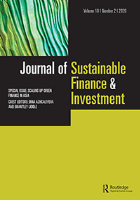
Journal of Sustainable Finance & Investment
Transforming Financial Practices for Environmental ImpactThe Journal of Sustainable Finance & Investment, published by Routledge Journals, Taylor & Francis Ltd, stands as a premier academic platform dedicated to advancing research in sustainable finance and investment practices. With an ISSN of 2043-0795 and E-ISSN of 2043-0809, this journal has carved out a significant niche in the landscape of interdisciplinary finance studies since its inception in 2011. Located in the United Kingdom, it is distinguished by its impressive quartile ranking of Q1 across prominent categories, including Business and International Management, Economics, Econometrics and Finance, and Finance. The journal boasts an exceptional Scopus rank, sitting in the top-tier percentile in multiple fields, underscoring its rigorous academic standards and the impact of its published research. Aimed at researchers, professionals, and students passionate about finance's role in promoting sustainability, the journal prioritizes innovative studies that interface financial systems with social and environmental imperatives. Although it currently does not offer Open Access, it remains a crucial resource for accessing cutting-edge insights and shaping sustainable investment practices globally.
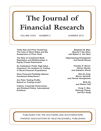
JOURNAL OF FINANCIAL RESEARCH
Bridging Theory and Practice in FinanceThe JOURNAL OF FINANCIAL RESEARCH, published by WILEY, stands as a pivotal platform for disseminating innovative research in the fields of finance and accounting since its inception in 1978. With an ISSN of 0270-2592 and an E-ISSN of 1475-6803, this journal aims to address contemporary challenges and trends within the financial research landscape. It has achieved notable recognition, being placed in the Q2 category for both Finance and Accounting in the 2023 rankings, signifying its relevance and impact within the academic community. Although it does not currently offer open access, the journal is accessible through various academic databases, catering to a diverse audience of researchers, professionals, and students keen on advancing their knowledge and understanding of financial systems and methodologies. With an evolving scope that encompasses empirical studies, theoretical frameworks, and practical applications, the JOURNAL OF FINANCIAL RESEARCH is committed to contributing valuable insights into the complexities of financial practices and policies.
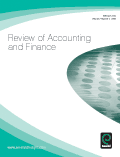
Review of Accounting and Finance
Bridging Theory and Practice in Financial ScholarshipReview of Accounting and Finance, published by EMERALD GROUP PUBLISHING LTD, is a prestigious academic journal with a longstanding commitment to advancing scholarship in the fields of accounting, finance, and economics. With an ISSN of 1475-7702 and E-ISSN of 1758-7700, this journal has established itself as a key resource for researchers, professionals, and students seeking robust empirical and theoretical insights. It enjoys a strong reputation, reflected in its 2023 Scopus rankings, where it is positioned in the top quartile for Economics and Finance, and holds a Q2 category in Accounting. The journal covers a wide range of topics, aiming to foster discussion and disseminate knowledge that bridges the gap between theory and practice. Although it does not offer open access, its comprehensive scope is invaluable for those dedicated to understanding the complexities of financial systems and accounting practices from a global perspective. Published continuously from 2002 to 2024, the Review of Accounting and Finance is an essential outlet for innovative research that drives the discipline forward.
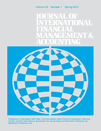
Journal of International Financial Management & Accounting
Connecting Global Perspectives in Financial ManagementThe Journal of International Financial Management & Accounting is a premier academic publication dedicated to advancing the fields of accounting, finance, and business management on an international scale. Published by Wiley, this esteemed journal boasts an impressive track record since its inception in 1989, converging insights from 1992 onwards to deliver cutting-edge research and analysis up to 2024. With an exceptional impact factor, the journal is ranked in the top quartile across multiple categories—Q1 in Accounting, Q1 in Business, Management and Accounting, and Q1 in Finance—as per the latest assessments. Its Scopus rankings further underscore its significance, placing it amongst the top 5% of journals in its respective fields. Although the journal is not open access, it remains an essential resource for researchers, professionals, and students seeking in-depth knowledge and innovative perspectives in international financial management and accounting practices. The journal’s commitment to high-quality research makes it a vital platform for thought leadership in a rapidly evolving global financial landscape.

International Journal of Managerial Finance
Advancing financial insights for effective decision-making.The International Journal of Managerial Finance is a leading academic journal published by Emerald Group Publishing Ltd, dedicated to advancing the field of finance through rigorous research and scholarly discourse. Its ISSN is 1743-9132, with an E-ISSN of 1758-6569. Since its inception in 2005, the journal has provided valuable insights and frameworks that bridge theory and practice in managerial finance, making it an essential resource for researchers, professionals, and students alike. With its current standing at Q2 in both Business, Management and Accounting and Finance categories for 2023, and impressive Scopus ranks that place it in the 70th and 68th percentiles respectively, the journal is recognized for its high-quality contributions to the field. Though it does not currently offer open access, the rigorous selection process ensures that published articles are of the highest academic standard, providing a platform for significant discussions around contemporary issues in finance and management. The International Journal of Managerial Finance continues to play a pivotal role in shaping the discourse within the financial sector, fostering knowledge that is instrumental for effective managerial decision-making.
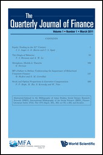
Quarterly Journal of Finance
Transforming Ideas into Impactful Financial KnowledgeThe Quarterly Journal of Finance, published by World Scientific Publishing Co. Pte Ltd, serves as a vital resource for the global academic community in the fields of Finance, Economics, and Strategy and Management. With an ISSN of 2010-1392 and E-ISSN 2010-1406, this journal boasts a respectable impact factor reflective of its standing, being ranked in the Q2 quartile across multiple categories in 2023. The journal's diverse scope includes innovative research and critical reviews that address current issues in financial practices and economic strategies, making it a pertinent platform for scholars and industry professionals alike. Despite its lack of open access, the journal's rigorous selection process ensures the publication of high-quality, impactful research. The Quarterly Journal of Finance is particularly distinguished for its commitment to advancing knowledge and fostering dialogues within its converging fields, proving to be an indispensable asset for researchers, professionals, and students eager to stay abreast of developments from 2011 to 2024 and beyond.

Financial Innovation
Transforming Research into Practice in Financial InnovationFinancial Innovation, published by Springer, is a premier open access journal that has been contributing to the fields of finance and management of technology and innovation since its inception in 2015. With an impressive Q1 category ranking in both Finance and Management of Technology and Innovation, the journal places itself at the forefront of academic research, reflected in its Scopus rankings—#17 out of 317 in Finance (94th percentile) and #29 out of 289 in Management of Technology and Innovation (90th percentile). Centered in Germany, this journal aims to disseminate high-quality research that fosters theoretical and practical advancements within its scope, encouraging exchanges between academia and industry. The open access model enhances visibility and accessibility of published research, thus playing a critical role in shaping the future of financial practices and technology management. For researchers, professionals, and students alike, Financial Innovation remains essential for staying abreast of cutting-edge developments and trends in these dynamic fields.

JOURNAL OF FINANCIAL ECONOMICS
Exploring the intersection of finance, economics, and innovation.Welcome to the JOURNAL OF FINANCIAL ECONOMICS, a premier publication in the realms of finance, economics, and accounting, published by Elsevier Science SA in the Netherlands. With its impactful contributions since 1974, this esteemed journal has earned an impressive impact factor and consistently ranks in the Q1 category across various fields, including Accounting, Economics and Econometrics, Finance, and Strategy and Management. Researchers can access cutting-edge studies that delve into both theoretical frameworks and empirical analyses, crucial for advancing financial literacy and economic policies globally. With remarkable Scopus rankings, notably placing #2 in Accounting and #6 in Finance, the journal serves not only as a reliable resource for academics but also as a vital tool for professionals seeking to stay abreast of the latest financial trends and insights. Engage with the latest research and contribute to the dialogue shaping the future of financial economics!
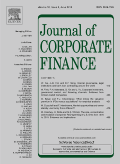
JOURNAL OF CORPORATE FINANCE
Advancing the Frontiers of Corporate Finance ResearchJOURNAL OF CORPORATE FINANCE, published by Elsevier, is a premier academic journal that represents the forefront of research in the fields of corporate finance, economics, and management strategies. With an impressive Q1 ranking across multiple categories and a 95th percentile standing in Scopus rankings, this journal is pivotal for advancing knowledge and fostering discourse among scholars, practitioners, and students globally. The Journal has been in continuous publication since 1994 and welcomes submissions that contribute to the understanding of corporate finance and related disciplines. Although it operates under a traditional access model, the Journal offers a rich repository of research outcomes pivotal for informed decision-making in corporate environments. Researchers and professionals looking to enhance their understanding of contemporary finance phenomena will find the JOURNAL OF CORPORATE FINANCE an invaluable resource.
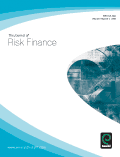
Journal of Risk Finance
Driving innovation in risk finance scholarship.The Journal of Risk Finance, published by Emerald Group Publishing Ltd, is a premier academic journal dedicated to advancing the understanding of risk management and finance practices since its inception in 1999. With a strong foothold within the Q2 rankings in both Accounting and Finance categories, it proudly holds a significant place in the scholarly landscape, ranking #54 out of 317 in the Scopus Economics and Finance category, placing it in the 83rd percentile. The journal aims to facilitate the exchange of innovative research and practical insights, catering to an audience of researchers, professionals, and students eager to explore contemporary issues in risk finance. While not an open access journal, it provides numerous access options, ensuring that essential findings reach a broad readership. Set in the United Kingdom and covering publications up to 2024, the Journal of Risk Finance continues to be an indispensable resource for those committed to this critical field.